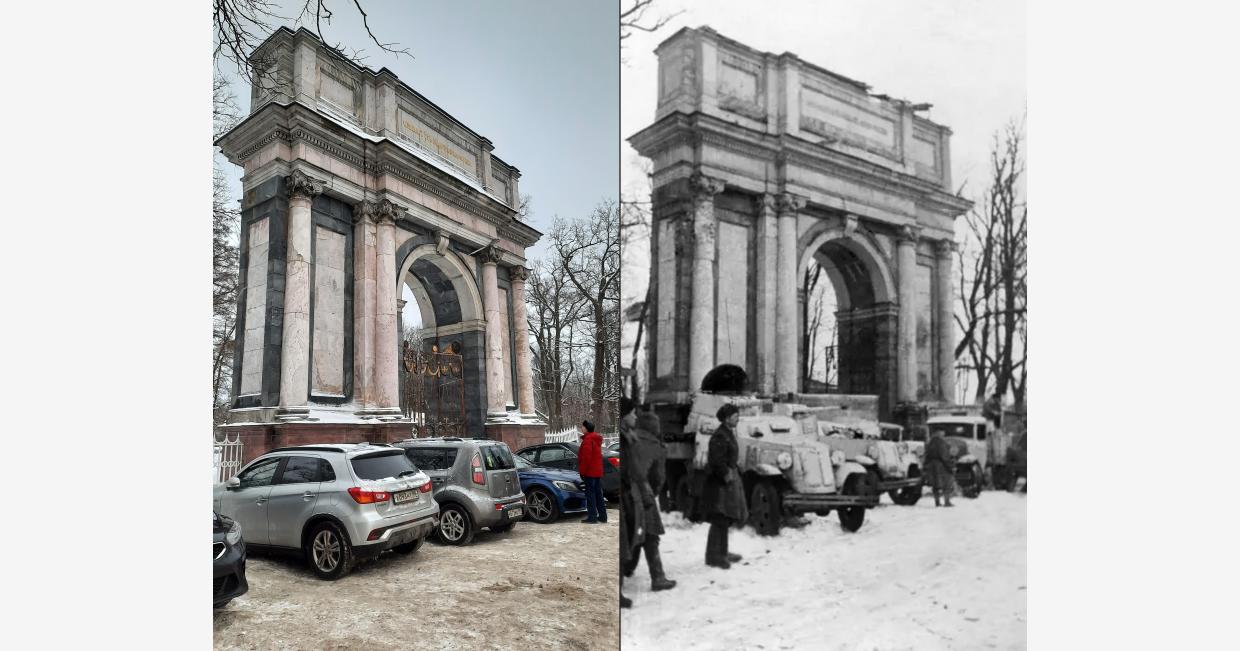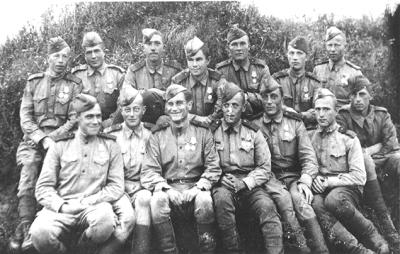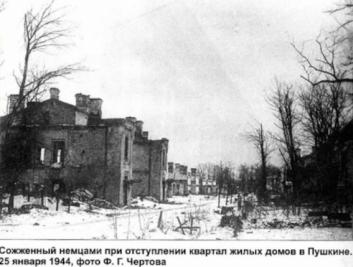Pushkin, Parkovaya street. January 24, 1944 / Pushkin, Parkovaya street. January 2021
Soviet soldiers standing next to BA-10 armoured cars and trucks parked next to the Orlovsky gate.
From the book by Yuri Nikulin, famous Soviet actor and comedian, "Seven long years". He served as an AA gunner on the Leningrad front. During the war he was awarded the medals "For Courage" and "For the Defense of Leningrad". In the chapter "Two meetings" he told the story of his fighting comrade Nikolay Belov. (based on an article in "Tsarskoselskaya gazeta")
"Nikolay was from Pushkin himself, and when we were sat in trenches near this little town, he could see his own house through the binoculars. Pushkin was occupied by the Germans [on September 17, 1941 - Alexander Shmidke], and his father and mother stayed there. When we entered the town, we almost didn't see any of its residents. During their retreat the Germans burnt it down almost completely. Only on the third day after our entry into Pushkin (out detachment was awarded the honorific title "Pushkinsky" for its liberation) the locals started coming back from villages and dugouts in the woods. Some of them peered into each soldiers' face attentively, hoping to find their relatives and loved ones among us. One woman stood by the roadside and kept asking the passing by troopers: "Don't you have my son, Kolya Belov, in your unit by chance?"
We also passed along this road and inquired with us too. We answered her with joy: "Yes, we've got that one! He's from Pushkin". This is how the mother met her son. Nikolay's father was hanged by the fascists on the first day of the occupation. His mother managed to flee into one of the nearby villages where she lived in a dugout. Kolya Belov was granted a one day leave to see his mother".
From "Combat and Genocide on the Eastern Front: The German Infantry's War, 1941–1944 (Cambridge Military Histories)" by Jeff Rutherford:
"Sometime near the midpoint of its occupation, Army Group North compiled a list of several cities in its area of operations and compared their present populations with those of 1934.1 The decline was eye-opening, if not altogether unexpected. Smaller communities such as Chudovo and Liuban, which numbered 12,000 and 11,800 respectively in 1934, dropped to 4,500 and 7,000 during the German occupation. The larger cities experienced a more drastic depopulation: Pavlovsk fell from 24,000 inhabitants to 1,200; Staraia Russa from 26,700 to 1,500; and, most shockingly, Pushkin from 51,000 to a mere 700. Policies of other German organizations such as the SS and the Economic Staff East actively contributed to this decimation of the Soviet population, but it was the Wehrmacht that exercised real power and authority over these areas and it therefore shoulders the overwhelming responsibility for the events that transpired in the swamps, forests, villages, and cities of northwest Russia...
In order to deny the advancing Red Army anything with a possible application for military purposes, Army Group North engaged in a systematic and comprehensive program of scorched earth that devastated northwest Russia, rendering it a virtual desert. This was now viewed as the only means to achieve victory or at least a stalemate against the Soviets. German occupation policy had now swung full circle. Attempts to win over the population during late 1942 and in 1943 were discarded in favour of the application of force, resembling those practices that had occurred during Operation Barbarossa. As the Wehrmacht pulled out of Russia proper in mid-1944, it finally waged the all-encompassing and destructive war envisioned by Hitler in 1941."


